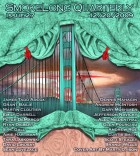I love it how this story interweaves so many details and minor characters with the main plot. Everything feels so true and rich and alive. I got the feeling that there could be a story about everyone on the block: The Honeycutt family, Julia (and her tense relationship with the other mothers), Stefan, even Mrs. Fanucci and her pottery wheel. Can you imagine expanding this piece, or writing related stories about the other characters?
Hmmm. That’s a good question. I suppose I can imagine expanding this piece, although I haven’t done that as of yet. I can say that the world of this story is one that resonates pretty deeply with me and one that I wouldn’t mind exploring further.
I have another question about all the small things in this story. I was so impressed by the way you use them to make a point, e.g., show the contrast the contrast between Shell’s family and the Honeycutt’s (the microwaved Little Debbie Snacks vs. the delicious cupcakes, the cola brown hair vs. the name “Honeycutt”, the shimmering (but probably cheap) gold sandals, the charm bracelet, the ice blue dress vs. the green plastic plates. It all seems to fit without being obvious or obtrusive. I wonder how you choose details like that as a writer. Do they appear fully formed in your mind, or are you actually pondering them before writing (along the lines of “what kind of dress would Julia wear”)?
I appreciate your comments about the details in the story. What happens for me when I am writing is that most things just sort of appear- It’s pretty intuitive in the initial drafting. Sometimes in the later drafts, I sift through and flesh out and make more conscious choices. However, I am not always thinking about how the small things are working together to make a point. Or maybe I’m just not aware that that is what I am doing.
That last line—”Those people make it look so easy.” I was so struck by the contrast between Julia’s tense, restless character and the relaxed atmosphere at the Honeycutt’s that I was relieved to hear Julia admit her jealousy, or perhaps her frustration. I wonder what specifically she is alluding to—the Honeycutt’s popularity (as opposed to herself being shunned by the other mothers), or Mrs. Honeycutt’s effortless friendliness (in greeting Julia and putting the basket in the middle of the table). Does she want other people to be nicer to her—or does she want to be nicer herself?
I think those people are all the people that Julia considers “other”—people she claims she wouldn’t want to be. Those people are Daniel the savant, the “perfect” housewifey women, the “good” mothers and fathers. Whether or not she is being truthful with herself is another story. She probably wants to be more like them than she cares to admit. She just doesn’t know how.
I wondered about the significance of Julia claiming that she’s an artist. Obviously, her daughter isn’t quite buying into it. Are Julia’s allusions to her artistic temperament an attempt at rationalizing her sense of being misunderstood? I wonder how many such artists there are. I wonder what would happen if she tried to paint—or write.
I think Julia is desperate for an identity and claiming the one of artist seems the only way she can rationalize her restlessness and inability to find her place. She is one of those people that hides behind the “idea” of being an artist rather than actually making anything. I think maybe she has tried to make stuff, but probably in secret, thus her daughter’s skepticism.
Considering that the story is entitled “Bowling for Dollars”, I was surprised at how little thought I gave to autistic Daniel Honeycutt and the fact that he was a contestant on the show. That part of the story was a little bit like a T.V. running in the background. The audience, I thought, was more interesting than the show. Was this intended as an illustration, almost, of what it means to be “normal”—in other words, that being “normal” is about (self-) acceptance rather than labels such as “autism”?
Yes I was definitely playing around with the idea of “normal” and perceptions of what that means. And I like the idea of a game show vs. the “game” of living, mothering, being…everyone is hoping to win and be recognized in some respect. Oh, and I guess I just like the image (and sound) of a bowling ball heading down the lane—the crashing sound of a strike or the sound of it missing the pins and getting sucked down the chute and out of sight- and then the magic when it pops back up again ready for another roll.



 The SmokeLong Grand Micro Contest (The Mikey) is now an annual competition celebrating and compensating the best micro fiction and nonfiction online.
The SmokeLong Grand Micro Contest (The Mikey) is now an annual competition celebrating and compensating the best micro fiction and nonfiction online.